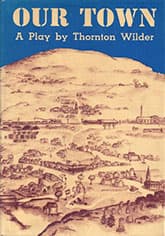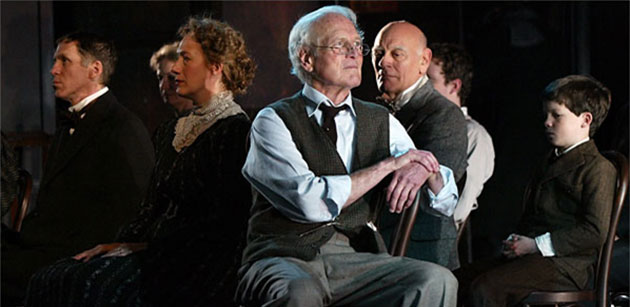Our Town
Critique • Quotes • At the movies
 First edition
First editionOur Town
First performance
1938, Princeton, New Jersey
Literature form
Play
Genres
Tragedy, meta-theatre
Writing language
English
Author's country
United States
Length
Three acts, approx. 18,500 words

The "Stage Manager" (Paul Newman) sits with the dead in the 2003 television film of Our Town.
Back to the play
Our Town (2003): Television film, 120 minutes; ddirected by James Naughton; featuring Paul Newman, Maggie Lacey, Ben Fox, Jane Curtin, Jeffrey Munn, Jayne Atkinson, Frank Converse
There's no way to get around it. The lead character in the 2003 television production of Our Town is Hollywood leading man Paul Newman, he of the blue-eyed superstar charisma. Executive produced by, no less, acclaimed Hollywood star Joanne Woodward, his spouse.
Well, actually there is a way around it. Just watch the film. Newman is perfect in the role of so-called Stage Manager, banning every grand gesture, suppressing every urge to curry favour with the audience by slipping in actorly expressions of sentiment or nostalgia, or moments of pseudo-profundity. In short, his steely demeanor while addressing the audience directly, narrating life in the town right down to the inexorable fate of its residents, is exactly what Thornton Wilder called for in the play's production on stage.
Wilder may have given in to Hollywood demands for a warmer story with the first movie adaptation of Our Town, more than six decades earlier, but the current stars of stage, TV and the silver screen who bring this production to the public show how it can be done effectively without those compromises.
Of course, it helps that this is really a film of a theatrical production that first ran in Connecticut and on Broadway before going before the cameras. No writer beyond Wilder is listed for this TV movie, since it really is the man's original stage drama with only a few minor revisions to the text here and there.
Emily Webb's (Maggie Lacey) goodbye to life in televised production of Our Town.
The stage is bare with a dark backdrop and the characters rely on miming their daily activities in the town sans props apart from a few tables and chairs that are brought on and off the stage before our eyes.
In addition to Newman, who was award-nominated for this film, a number of familiar faces grace the stage. TV and film stalwarts Jane Curtin and Kate Atkinson were both also honoured for their roles as the mothers Webb and Gibbs. Ubiquitous stage and screen actors Jeffrey DeMunn and Frank Converse are effective as their respective husbands.
But the real stars are two mainly stage actors you likely do not recognize, Ben Fox and Maggie Lacey as their romantically linked kids, George and Emily. Lacey is particularly moving as her character's death and revisitation with the living takes the play in a dark and bittersweet (emphasis on bitter) direction in the last act.
Somehow though, the ending, true to the original, is not all that upsetting. After Emily's resigned return to ghostly limbo without histrionics and when Newman's Stage Manager looks into the camera at the end and talks of the townsfolk going to sleep at the end of the day and he unemotionally but sincerely wishes sleep to the viewers, you can't help but accept, yes, it's too bad but this is the way it has to go and that's okay. Everything is as it should be in our town.
— Eric
Critique • Quotes • At the movies
1940, 2003

